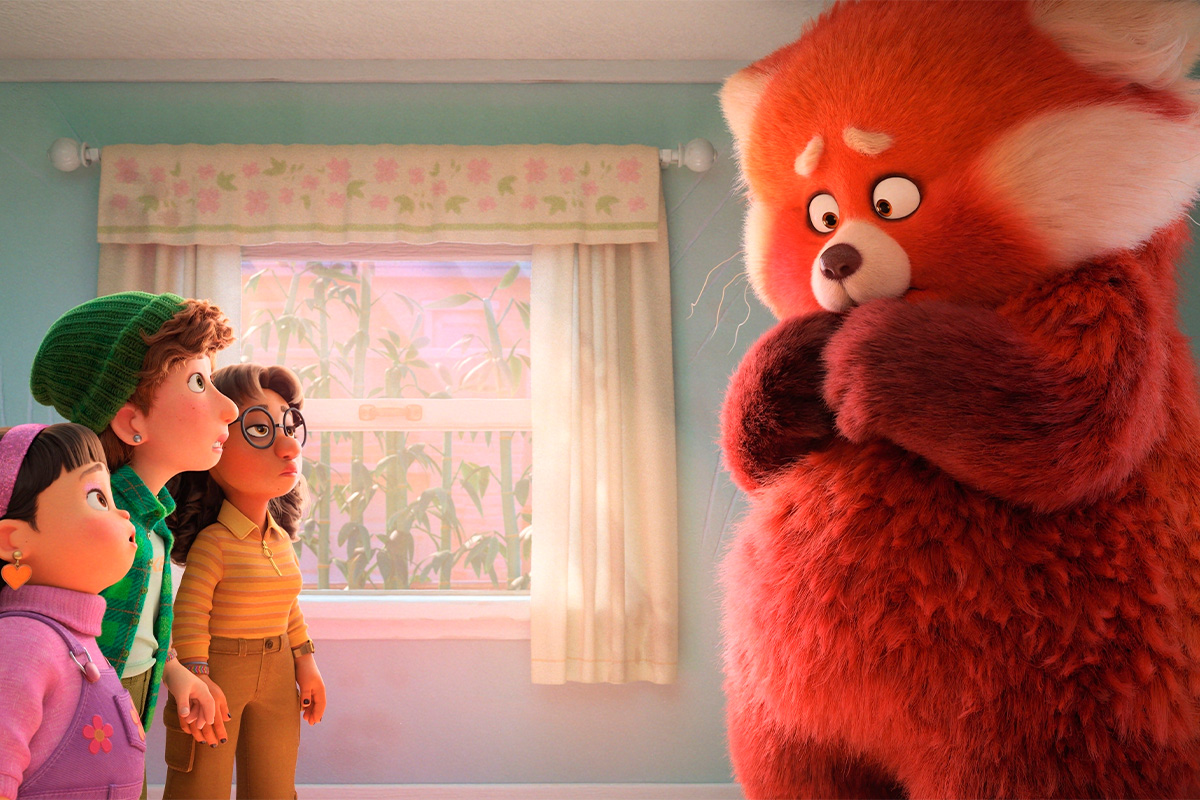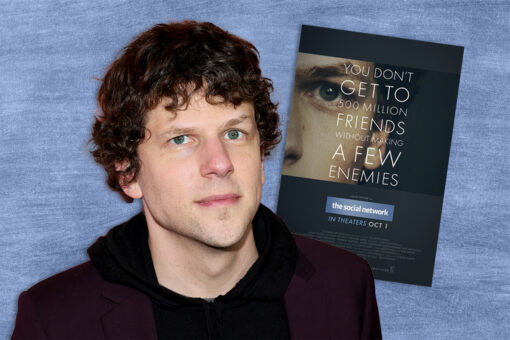With an opening line like, “The number one rule in my family? Honor. Your. Parents,” Pixar’s “Turning Red” set itself to become an endearing, emotional and unsettlingly accurate mirror for children of immigrants everywhere. As I shoved yet another tearful spoonful of vegan ice cream in my mouth (I got the Ashkenazi digestive gene), I decided to keep a list of all the reasons this movie made me feel so seen.
It took less than a minute of run-time for the 13-year-old Chinese Canadian Meilin “Mei” Lee’s agonizingly wholesome monologue to send me into a full sob. “They’re the supreme beings,” she speaks of parents, “who gave you life, who sweated and sacrificed so much to put a roof over your head, food on your plate — an epic amount of food.” Thoughts of chicken soup, kubbeh, potato kugel and sambusak filled my mind. “The least you can do in return,” Mei continues, “is every single thing they ask, of course.” With that, my driven, neurotic, overachieving Jewish inner child broke to pieces.
Directed by Domee Shi (the mastermind behind Pixar’s 2018 short film “Bao”), “Turning Red” is Pixar’s celebration of every cringey part of teenage girlhood we’d like to forget. It also shines a light on a familiar familial dynamic, at least to me: parental figures who are sweet, nurturing and loving — so long as rules are respected and expectations are upheld. Less relatable is Mei’s family’s blessing-turned-curse that causes her to turn into a giant red panda whenever she experiences strong emotions. The unmistakable metaphor for the repression of emotional outbursts has been received fondly by viewers; the seeming encouragement for children to “go their own way,” however, was not.
“Turning Red” continues to face backlash from parents claiming the film is too edgy and justifies disobeying parents. Some critics have also vocalized concern that the narrative is too niche to be appreciated by a broad audience. But these critiques point directly at the writers’ highly relatable thesis: “We’ve all got a messy, loud, weird part of ourselves hidden away, and a lot of us never let it out.” Viewers are brought along for the journey as Mei learns that the parts of herself that have been deemed undesirable by the highly efficient, protective culture perpetuated by years of generational trauma are actually perfectly fine.
Despite growing up as a New York Jew, and not a Chinese Canadian, this movie made me feel seen in a way I never have. With a savta who speaks of her majestic, canonically magical childhood home in Iraq before her exile and subsequent relocation to the U.S. for greater opportunities, a bubbe who was born in Dachau, and a mom who fought hell and highwater to give me the best childhood she could with what little she had, it’s hard for me not to feel like they don’t hold stakes in my professional success. I remember how resigned I felt, seated at the dining room table as Savta authoritatively instructed me to read and translate the chapter of Tanakh she was teaching me yet again. I can still feel the heaviness of my backpack with the weight of my report card inside. How I knew that the weeks leading up to Passover were reserved for helping out at Bubbe’s dress shop. The way that Savta taught me to how to do “sponja,” a painstakingly athletic method of washing the floor with a wet towel and an oversized squeegee.
Watching Mei take pride in her chores and academics, just as I did and continue to do, flooded me with the rush that their praise gave me when I was growing up. I saw my mom and grandmothers’ austere maternal exterior in Mei’s parents, doing everything in their power to raise a refined, respectful, ambitious young lady. And I saw myself in Mei, doing everything in her power to present herself that way.
Mei’s opening monologue ends on an optimistic note: “Some people are like, ‘be careful, honoring your parents sounds great, but if you take it too far you might forget to honor yourself.’ Luckily I don’t have that problem.” As the movie progresses, it become obvious to viewers that perhaps that statement is less than true. While Mei firmly believes that she doesn’t struggle with her ability to honor her authentic self, and confidently returns her friends’ prompts to “live a little” or “take a break” with the same resolution, the following scenes show Mei shaming herself for drawing suggestive images of her and a crush, and lying to her mother about her obsession with 4*Town (Pixar’s hilariously accurate parody of early 2000s boy bands that low-key made a bop?).
Growing up, I wish I had more freedom to focus on wearing what I liked instead of wearing black to create the illusion of a less “zaftig” figure. Truthfully, I still feel angry about the hour or two I shamefully borrowed the landline at my friends’ houses for my daily Tanakh lesson during sleepovers. I wasn’t always dutiful and excited to complete my chores. But this honesty with myself also made Mei’s metamorphosis that much more meaningful. Watching the prodigal daughter of immigrant parents experience the consequences of messing up and “releasing the red panda” felt so. damn. good.
Which leads me to the temple scene, which after more than a dozen rewatches, still brings me to tears. It begins with Mei and her mother kneeling peacefully in prayer, lighting incense and invoking the blessings of their beloved ancestors. I was immediately transported to peaceful Friday nights that followed hectic Friday afternoons. The apartment would be permeated by the light of the Shabbat candles after hours of frantically transporting groceries, cooking and, of course, cleaning.
Mei and her mother display a particular kind of partnership that I have witnessed across not only my family, but my Jewish friends and their mothers, and my friends of immigrant families. It’s a sort of unspoken routine that gets established between a mother and her daughter — one of expectations and duty to one another, but also of equally unspoken, abundant love and adoration. It’s a dynamic created not only by the maternal bond, but by the honor and duty of carrying the tradition forward. I remember receiving my own talk about “the red peony blooming’’— the movie’s euphemism used for menstruation — which was less of a talk and more of a warning about how our family’s early emergence into womanhood was a birthright and a great blessing in our family (though that one fateful day in fourth grade certainly made me feel less than blessed).
The way Mei’s mother prays the ancestors will guide the family, and Mei especially, is infused with that same hope, anxiety and desperation that infused our Shabbat prayers: “Ve’zakeini le’gadel banim u’vnei vanim,” or, “Make me worthy to raise learned children and grandchildren, who are wise and understanding.” This temple ritual moment was suffused with the same energy of mesorah, the transmission of tradition, something that felt so uniquely Jewish to me but now being expressed in a Chinese-Canadian family, with a daughter that is every bit as quirky, clumsy and cringey as me.
While I saw so much of myself in Mei, her best friend Miriam also reminded me of my “mom of the friend group” tendencies and the innate ability to hold it all together when shit hits the fan. And while Miriam’s cultural heritage is not outright defined, I’m going to go ahead and assume she’s Jewish. I never quite had to monetize my friends’ intermittent animorphs for tickets to forbidden boy band concerts, but I sure as hell used my debate team tactics to manipulate some reluctant parents into some sleepovers. I was also more than a little chunky, and spent years trying to manage my hair before settling on a braid overshadowed by an obnoxiously large beanie, just like Miriam.
The authenticity in the portrayal of Mei and her friends, from varying physiques to patchy eyebrows and aggressive looking braces, was incredibly affirming when I think back on my own awkward pre-teen self. I saw caricatures of my friends and our own rituals — ditching social scenes for more intimate spaces and dessert, taking videos of ourselves singing truly horrifying renditions of songs we loved.
“Turning Red” is a uniquely Chinese coming of age story, but it helped me explore and redefine some of my own memories that begged to be addressed, and to that, I am deeply grateful.



